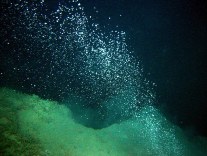Scientists have uncovered what appears to be a further dramatic increase in the leakage of methane gas that is seeping from the Arctic seabed.
Methane is about 20 times more potent than CO2 in trapping solar heat.
The findings come from measurements of carbon fluxes around the north of Russia, led by Igor Semiletov from the University of Alaska at Fairbanks.
“Methane release from the East Siberian Shelf is underway and it looks stronger than it was supposed to be,” he said.
Professor Semiletov has been studying methane seepage in the region for the last few decades, and leads the International Siberian Shelf Study (ISSS), which has launched multiple expeditions to the Arctic Ocean.
The preliminary findings of ISSS 2009 are now being prepared for publication, he told BBC News.
Methane seepage recorded last summer was already the highest ever measured in the Arctic Ocean.
High seepage
Acting as a giant frozen depository of carbon such as CO2 and methane (often stored as compacted solid gas hydrates), Siberia’s shallow shelf areas are increasingly subjected to warming and are now giving up greater amounts of methane to the sea and to the atmosphere than recorded in the past.
This undersea permafrost was until recently considered to be stable.
But now scientists think the release of such a powerful greenhouse gas may accelerate global warming.
Higher concentrations of atmospheric methane are contributing to global temperature rise; this in turn is projected to cause further permafrost melting and the release of yet more methane in a feedback loop.
A worst-case scenario is one where the feedback passes a tipping point and billions of tonnes of methane are released suddenly, as has occurred at least once in the Earth’s past.
Such sudden releases have been linked to rapid increases in global temperatures and could have been a factor in the mass extinction of species.
According to a report by the US National Oceanic and Atmospheric Administration (Noaa), the springtime air temperature across the region in the period 2000-2007 was an average of 4C higher than during 1970-1999.
That is the fastest temperature rise on the planet, claims the university.
The recent thaw over the last decade means that some of the large reserve of carbon from organic material such as dead animals and plants in sediments is now being released into the sea and into our atmosphere.
Trapped below that is the methane hydrate now warming and leaking through holes in the defrosting sediments.


